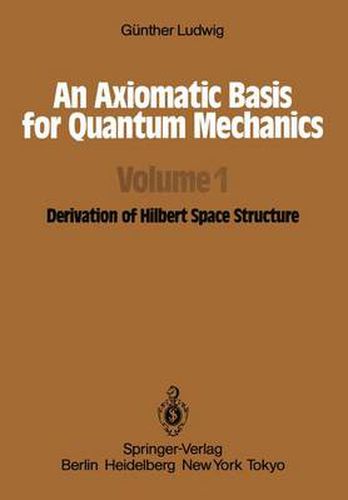Readings Newsletter
Become a Readings Member to make your shopping experience even easier.
Sign in or sign up for free!
You’re not far away from qualifying for FREE standard shipping within Australia
You’ve qualified for FREE standard shipping within Australia
The cart is loading…






This title is printed to order. This book may have been self-published. If so, we cannot guarantee the quality of the content. In the main most books will have gone through the editing process however some may not. We therefore suggest that you be aware of this before ordering this book. If in doubt check either the author or publisher’s details as we are unable to accept any returns unless they are faulty. Please contact us if you have any questions.
This book is the first volume of a two-volume work, which is an improved version of a preprint [47] published in German. We seek to deduce the funda mental concepts of quantum mechanics solely from a description of macroscopic devices. The microscopic systems such as electrons, atoms, etc. must be detected on the basis of the macroscopic behavior of the devices. This detection resembles the detection of the dinosaurs on the basis offossils. In this first volume we develop a general description of macroscopic systems by trajectories in state spaces. This general description is a basis for the special de scription of devices consisting of two parts, where the first part is acting on the second. The microsystems are discovered as systems transmitting the action. Axioms which describe general empirical structures of the interactions between the two parts of each device, give rise to a derivation of the Hilbert space structure of quantum mechanics. Possibly, these axioms (and consequently the Hilbert space structure) may fail to describe other realms than the structure of atoms and mole cules, for instance the elementary particles . This book supplements ref. [2]. Both together not only give an extensive foundation of quantum mechanics but also a solution in principle of the measuring problem.
$9.00 standard shipping within Australia
FREE standard shipping within Australia for orders over $100.00
Express & International shipping calculated at checkout
This title is printed to order. This book may have been self-published. If so, we cannot guarantee the quality of the content. In the main most books will have gone through the editing process however some may not. We therefore suggest that you be aware of this before ordering this book. If in doubt check either the author or publisher’s details as we are unable to accept any returns unless they are faulty. Please contact us if you have any questions.
This book is the first volume of a two-volume work, which is an improved version of a preprint [47] published in German. We seek to deduce the funda mental concepts of quantum mechanics solely from a description of macroscopic devices. The microscopic systems such as electrons, atoms, etc. must be detected on the basis of the macroscopic behavior of the devices. This detection resembles the detection of the dinosaurs on the basis offossils. In this first volume we develop a general description of macroscopic systems by trajectories in state spaces. This general description is a basis for the special de scription of devices consisting of two parts, where the first part is acting on the second. The microsystems are discovered as systems transmitting the action. Axioms which describe general empirical structures of the interactions between the two parts of each device, give rise to a derivation of the Hilbert space structure of quantum mechanics. Possibly, these axioms (and consequently the Hilbert space structure) may fail to describe other realms than the structure of atoms and mole cules, for instance the elementary particles . This book supplements ref. [2]. Both together not only give an extensive foundation of quantum mechanics but also a solution in principle of the measuring problem.